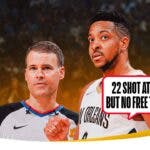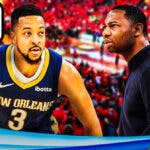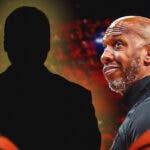Chauncey Billups believes what ailed the Portland Trail Blazers most on defense last season was attitude. He's preached the significance of a team-wide commitment to that side of the ball since being named Terry Stotts' replacement in late June, even going so far as to insist players who don't buy into it on a possession-by-possession basis will be benched.
Maybe that eyebrow-raising remark wasn't actually an intended, implicit warning to Damian Lillard as much as it was Portland's returning players en masse. It's not like C.J. McCollum or Norman Powell were immune from bouts of lethargy or a lack of overall engagement defensively a year ago, either. None of the Blazers' three starting guards made their mark in the league with defense, and all lack the collection of physical traits that could help them make up for brief lapses of edge and intensity like true impact defenders.
But Billups, like Neil Olshey, is of the opinion that Portland can do more than get by defensively this season despite being the only team in basketball poised to start a perimeter trio standing 6-foot-3 or shorter. Well, at least if Lillard, McCollum and Powell defend with the sustained effort the Blazers' rookie coach demands.
“I think in today’s game, you can play that way,” he told Aaron Fentress of The Oregonian about Portland's three-guard lineup. “But to me, if you’re going to win that way, all three of those guys have to be committed on the defensive end of the floor. That can be an issue. It’s already been an issue.”
That newfound emphasis on defense, lingering pressure stemming from Lillard's uncertain future in Rip City and a locker room full of established, hungry veterans should be enough for the Blazers to meet Billups' challenge. Don't underestimate the mental influence of replacing abject defensive minuses like Carmelo Anthony and Enes Kanter with Larry Nance Jr. and Cody Zeller. Stringing together stops is a five-man accomplishment in today's NBA, and Portland is bound to play with more confidence defensively knowing that its most imminently exploitable defenders have moved on.
The problem for Billups and the Blazers is that ready-made targets for opposing defenses still dot this roster, and there's nothing even a perfect marriage of scheme and temperament can do about it. His aims to deploy a more aggressive, help-based defensive attack is the right one. Stotts' ultra-conservative approach was gashed in 2020-21, yielding the second-worst defensive rating in the league. Olshey did his job to improve Portland's base of defensive talent this summer, too.
“We’re going to be a help defensive team,” Billups said to The Oregonian. “Nobody is on an island. Everybody’s helping each other. That’s the mentality we’ve got to have, and if we do, we’re going to be a pretty darn good team.”
But best-laid plans don't always work, especially when their success hinges on factors that can't be changed. There's no stretching the undersized Lillard, McCollum, Powell or Anfernee Simons into the type of long, rangy perimeter defenders best equipped to make disruptive plays on the weak-side and backline of a rotating defense.
Just like it's unrealistic to expect those guys to capably switch onto oversized wings and talented bigs without negative recourse, it's unrealistic to assume they'll consistently make life tough on offenses while digging into the nail from the weak wing or standing as the last line of defense at the rim. The defensive glass could prove problematic with Nurkic and Zeller extended to the perimeter given Portland's size deficit elsewhere, too. Covington and Nance are adequate rebounders for their positions, at least, but hardly dominant.
None of this is to suggest the Blazers won't take major strides defensively in 2021-22.
Better injury luck for Nurkic alone would spark that improvement. Portland's defensive rating with him on the floor last season was 109.5, per Cleaning the Glass, in the 81st percentile league-wide. The Blazers were even stingier when Nurkic played with Lillard, McCollum and Powell, though that group's defensive rating was at least somewhat lowered artificially by poor opponent three-point shooting. Portland won't be forced into play three guards full-time, either. Nassir Little and Tony Snell, though not stoppers, offer real size at small forward, and there will surely be times when Billups plays Covington and Nance together alongside Nurkic.
Those situational lineup margins will matter, especially under the playoff microscope when every possession takes on added significance. But just like the Blazers are fully committed to improving defensively, they're fully committed to a three-guard attack that puts an inherent ceiling on that end of the floor, best efforts be damned.




